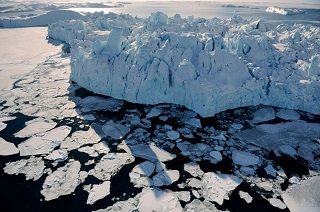What Happens in the Arctic Doesn't Stay in the Arctic

I certainly don’t have a good answer to that one, but I did find this a powerful and alarming read, as it shows how it’s possible that we have profoundly underestimated the effects that all this will have on every plant and animal on the planet.
Perhaps this is why Bill McKibben is so angry about the recent revelations that the executive strata at ExxonMobil, through the investigation of its own scientists, knew that all this was taking place as a direct result of the consumption of fossil fuels as early as 1978, and conspired to suppress this horrible truth. Exxon knew, McKibben says, and this two-word sentence has become the theme of a great deal of his current work, i.e., understanding what might have happened if the oil giant had told the truth on this subject 35 + years ago, and enabled our civilization to make adjustments in its approach to the generation and consumption of energy accordingly.
McKibben’s point: we wouldn’t have found ourselves in this terrible position. I’m afraid he’s right.
